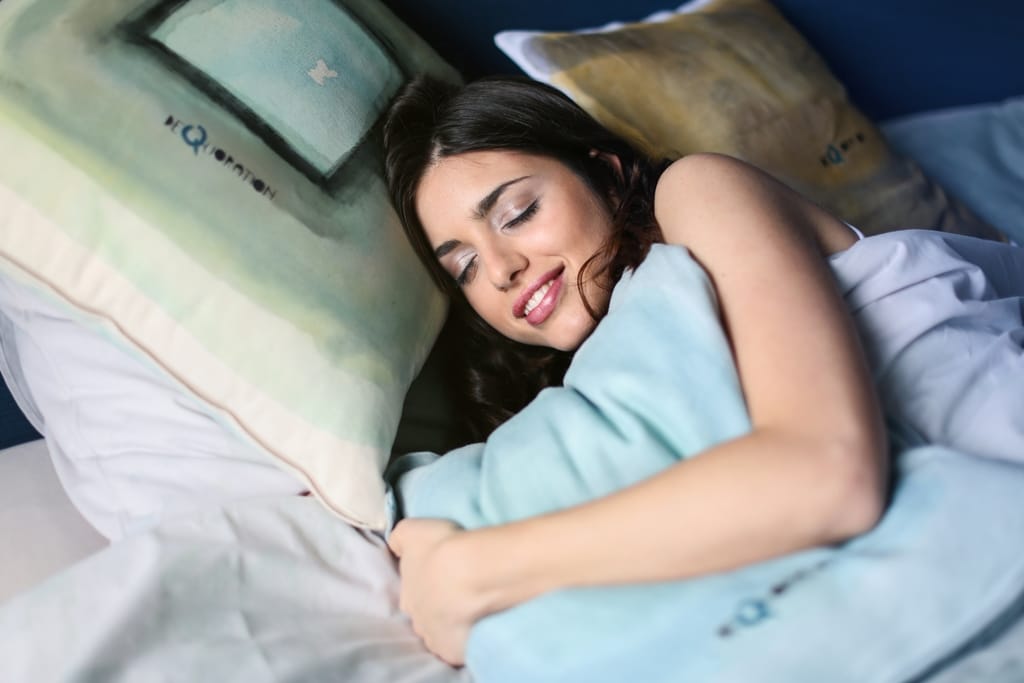01 Nov Why ‘Beauty Sleep’ isn’t a Myth!
 When was the last time you looked in the mirror at bedtime and thought you needed your beauty sleep? Is there really a link between a good night’s sleep, your health and the condition of your skin? Read on to find out.
When was the last time you looked in the mirror at bedtime and thought you needed your beauty sleep? Is there really a link between a good night’s sleep, your health and the condition of your skin? Read on to find out.
We spend about a third of our lives asleep. That may seem like a lot, but sleep is as vitally important for your body as eating, drinking and breathing. However, a report by the Royal Society for Public Health found that “the UK public is under-sleeping by an average of almost an hour every night”. One out of the eight hours adults are recommended to sleep may not seem that bad, especially when there are so many other things you could be doing instead! But sleep is strongly related to health; poor sleep can increase the risk of having poor health, and poor health can make it harder to sleep, creating a vicious cycle.
The Importance of Sleep
Sleeping well boosts your overall health in many ways:
- Sleep helps to lift your immune system; therefore, a lack of sleep can increase your chances of falling ill
- Sleeping less than 7 hours a day may cause you to put on weight
- An endless spell of sleepless nights can lead to depression and/or anxiety
- Studies have suggested that sleeping less than 5 hours a night may increase the risk of developing type 2 diabetes by changing the way our bodies process glucose
- An extended period of sleep deprivation seems to be associated with an increase in heart rate and higher blood pressure, which may put additional strain on your heart
- Lastly, a lack of sleep can affect fertility in both women and men, as regular sleep disruptions can reduce the secretion of the reproductive hormones required to conceive
Beauty Sleep and Skin Conditions
Furthermore, the concept of beauty sleep isn’t a myth. Far from it. A good night’s sleep has proved crucial for good skin health as sleep is essential for repairing, regenerating and restructuring the skin. A lack of sleep can therefore result in your skin losing its natural glow.
More importantly however, when you are sleep-deprived, your body produces more of the stress hormone, cortisol, which acts to encourage inflammation in the skin, causing flare-ups in conditions like acne, psoriasis, and even eczema. This can result in increased itching, which can then disrupt sleep, producing a vicious circle, in which your skin condition and sleep quality can progressively worsen together. A study published in the Journal of Investigative Dermatology that surveyed nearly 35,000 adults revealed that people with eczema had a higher chance of fatigue, daytime sleepiness and insomnia, leading to a greater incidence of sick days, doctor visits, and an increased risk of psychological disorders.
How to get a Good Night’s Sleep
There are many things you can do to help yourself fall into a revitalising, deep slumber, such as sticking to a consistent bedtime or engaging in some relaxation techniques before bed. You could try meditating, listening to soothing music or reading. Avoid eating heavy meals and drinking caffeine before you go to bed. Lastly, avoid keeping electronics in your room. Make your bedroom a place of sleep only, or at least turn off any electronics which emit light, such as computers or phones.
Does Dry Skin Affect Your Beauty Sleep?
If you suffer from a dry skin condition, such as eczema, which makes falling and staying asleep especially difficult, here are two more things you can do to improve your beauty sleep.
- One is to moisturise thoroughly before bed. A gentle cleanser followed by a moisturiser is the way to go. Robin Evans, MD, a board-certified dermatologist says, “For most people, an emollient-rich moisturizer should be applied after properly cleansing, before bedtime”. Look for a moisturiser that feels hydrating and soothing, but not overly heavy on your skin, such as the AproDerm® Emollient Cream, which acts to sooth, protect and moisturise your skin. The whole AproDerm® range is also free from SLS, parabens, benzyl alcohol, fragrances and colours, which are known common irritants and sensitisers, reducing the risk of skin irritation. It is best to apply an emollient 30 minutes to an hour before you go to bed to ensure the emollient is absorbed into your skin, or immediately after you get out of the bath or shower, while your skin is damp, to lock in all of that moisture. This will help alleviate the dryness of your skin, and therefore reduce the need to itch during the night.
- The other is to protect your bedroom skin. As well as keeping your bedroom cool and comfortable, as the urge to itch and temperature are closely related, make sure you choose bed linens that are made of a breathable fabric. Allergen-proof barrier covers on your mattress, duvet and pillows are also a good idea. Regularly wash your bedding (with fragrance-free laundry detergent) to ward away any pesky dust-mites, which act to further irritate your skin. For more tips on how to produce a skin-friendly bedroom environment, read our blog, Is Your Bedroom Skin Safe?
Finally
We all need our beauty sleep. I hope this blog helps you achieve a blissful sleep, one that allows you to wake up feeling refreshed and ready to face the day ahead!



Sorry, the comment form is closed at this time.